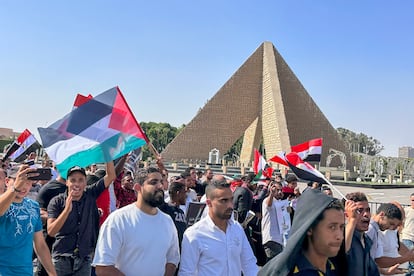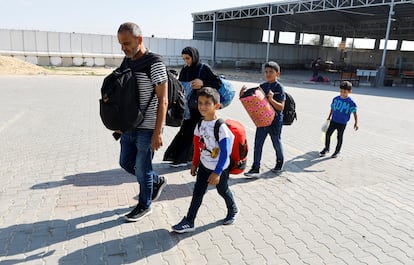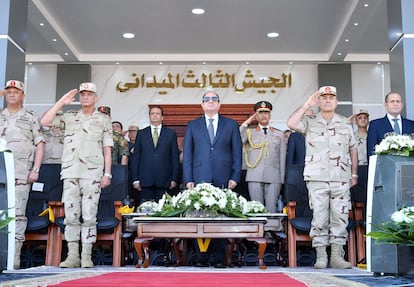Israel’s devastation of Gaza puts Egypt before its greatest fear
Cairo is increasingly concerned that Israel will forcibly displace Gazans to the Sinai Peninsula and that the groundswell of support for the Palestinian cause will turn against the government

Israel’s brutal military offensive in Gaza is putting Egypt in an increasingly delicate position. Since October 7, when Hamas launched its attack against Israel, Cairo has had to manage sending humanitarian aid into the Gaza Strip, evacuating foreigners and mediating with Qatar the release of Israeli hostages. At the same time, it also has to deal with internal protests and popular anger in the midst of an economic crisis.
From the outset, Cairo has said that any resolution that aims to ensure long-term peace and stability in the region must be built on the basis of the two-state solution and the end of Israel’s unilateral actions. But in the short term, the position of the Egyptian authorities in the face of the dizzying deterioration of the situation in their backyard is being shaped by their national security considerations, their desire to remain an influential actor in the area, especially in the eyes of the United States, and their fears that internal solidarity with Palestine will turn against them.
One of the scenarios that is of most concern to Egypt is the possibility that Israel will forcibly displace Palestinians from Gaza to the Sinai Peninsula. Indeed, since the beginning of the military offensive in Gaza, Israel has raised the option publicly and through diplomatic channels. Fears regarding this proposal were initially heightened after senior U.S. officials claimed to be negotiating the opening of a safe passage for civilians to leave Gaza, although talks have cooled in recent days.
Egyptian authorities categorically reject the idea because they do not want to be complicit in the forced displacement of the Gaza population, an outcome that would put an end to Palestinian’s hopes of creating a Palestinian state that includes the Gaza Strip. Cairo maintains that Israel, as the occupying power, is responsible for the enclave, and that the focus must be on protecting civilians.
“Egypt is opening its borders to the wounded in Gaza, to those seeking education and to all nationalities in the Gaza Strip. But forced displacement, in submission to the will of an occupying state that wants to liquidate the issue in collusion with Western and international governments, is a matter that Egypt rejects, and it will work to thwart these plans,” says diplomat Mohamed Hegazy, former advisor of the Egyptian Foreign Ministry.
Egypt is equally or more concerned that the forced displacement of Palestinians to the Sinai Peninsula would pose a threat to the country’s national security. On the one hand, armed Palestinian factions could attack Israel from Egyptian soil, which would give Israel reasons to attack Egyptian territory. At the same time, these factions could revitalize extremist groups in North Sinai just as Egypt has finally been able to reassert its control in the area following a decades-long brutal war against the local branch of the Islamic State, which included many members from Gaza.
“The [Palestinian] militant factions would rebuild their capabilities to a much greater extent inside Egypt, because they would have a much larger border, a much larger area, and they would be in the Sinai, which is where the weapons come from,” warns Mohannad Sabry, a security expert on the Sinai Peninsula. “At that moment, you can say goodbye to the peace agreements [between Egypt and Israel].”
Debt forgiveness
The main offer that is being proposed to tempt the Egyptian authorities to accept the forced displacement of Palestinians is a substantial cancellation of their debt at a time when the country is going through a serious economic crisis. But Cairo strongly opposes this option, and on October 31, Prime Minister Mostafa Madbouly announced a new five-year plan to develop North Sinai.
Rumors about a forced relocation of Gazans also raise concerns because, contrary to what Israeli authorities seem to suggest, the northeast Sinai is not an empty desert. In the last decade, as part of its anti-terrorism campaign, Egypt established a buffer zone around the border with Gaza in which it demolished thousands of homes and expelled tens of thousands of people. The possibility of Gazans being forcibly displaced to that area has prompted protests in recent weeks as hundreds of residents demand their own right of return, according to local human rights groups.

“North Sinai was never empty, it always had a population,” explains Sabry. “The [Egyptian] army had promised the displaced people of Sinai that they would return to their lands on October 10, which is the week the war started,” he adds. “Egypt has a simmering internal problem with this displaced population.”
Omar Shaban, the director of the Pal-Think for Strategic Studies research center in Gaza, says that the proposal of forced displacement “is also totally opposed by the Palestinians.” Indeed, Shaban notes that there are hundreds of Palestinians in Egypt who are waiting to return to Gaza, and that a large part of the population in the north of Gaza has rejected the Israeli order to leave for the south.
Diplomatically, Egypt security and political ties with Israel and Hamas have positioned the country as a key mediator in times of crisis in Gaza. In 2021, for example, Egypt was able to forge a ceasefire between Israel and Hamas after 11 days of bombings on Gaza. This has allowed it to elevate its position in the region, especially before the eyes of Washington.
Limits of Egyptian influence
The magnitude of the current crisis, however, has exposed the limits of Egypt’s influence and, despite its sustained efforts, it has been unable to stop the spiral of violence in Gaza. Furthermore, its image as an effective mediator on sensitive issues, such as the release of hostages kidnapped in Gaza, is being overshadowed by the intervention of Qatar, which maintains close relations with the political arm of Hamas and the United States.
Still, Egypt’s relative success in leading humanitarian aid to Gaza, coordinating the evacuation of foreigners, and organizing an international summit to address the situation — even if it ended without an agreement or joint communiqué — has allowed Egypt to capitalize on its strategic location, and maintain some control over the agenda.
Internally, the Israeli offensive on Gaza and the crimes being recorded are a significant political challenge for Egyptian authorities, which are being forced to maintain an increasingly difficult balance between their relations with Israel and the West and the overwhelming popular support for the Palestinian cause.
So far, authorities have tried to channel the widespread anger into controlled demonstrations, but they have also stepped up security in the fear that this groundswell of collective anger and frustration will turn against them.
In recent weeks, there have been significant protests at the Al-Azhar Mosque, one of the most important religious institutions in the Islamic world, and unions, professional associations and student organizations have mobilized, all groups which have been severely repressed in the last decade. Protests have also taken place in Cairo’s iconic Tahrir Square, the epicenter of the 2011 revolution.
“The Palestinian cause is a very complex cause within Egypt itself,” says Maged Mandour, an Egyptian political analyst. “[Egyptian President Abdel Fattah El-Sisi] is in a very complicated situation, because he cannot really meet the demands that the Israelis and Americans are making,” he points out. The president is striking “a very difficult balance,” he says, adding that it is exacerbated by the economic crisis.

Sign up for our weekly newsletter to get more English-language news coverage from EL PAÍS USA Edition
Tu suscripción se está usando en otro dispositivo
¿Quieres añadir otro usuario a tu suscripción?
Si continúas leyendo en este dispositivo, no se podrá leer en el otro.
FlechaTu suscripción se está usando en otro dispositivo y solo puedes acceder a EL PAÍS desde un dispositivo a la vez.
Si quieres compartir tu cuenta, cambia tu suscripción a la modalidad Premium, así podrás añadir otro usuario. Cada uno accederá con su propia cuenta de email, lo que os permitirá personalizar vuestra experiencia en EL PAÍS.
¿Tienes una suscripción de empresa? Accede aquí para contratar más cuentas.
En el caso de no saber quién está usando tu cuenta, te recomendamos cambiar tu contraseña aquí.
Si decides continuar compartiendo tu cuenta, este mensaje se mostrará en tu dispositivo y en el de la otra persona que está usando tu cuenta de forma indefinida, afectando a tu experiencia de lectura. Puedes consultar aquí los términos y condiciones de la suscripción digital.









































